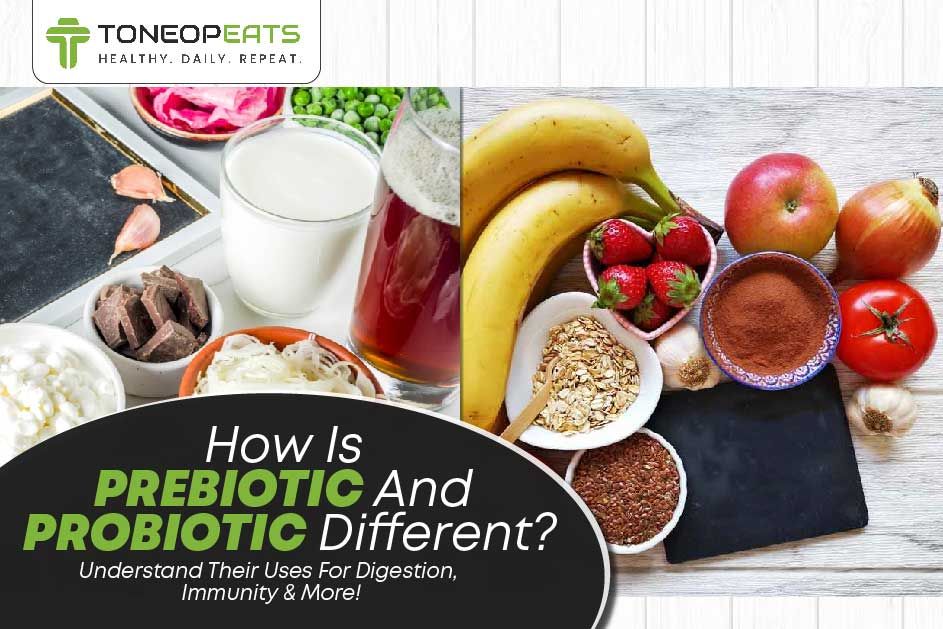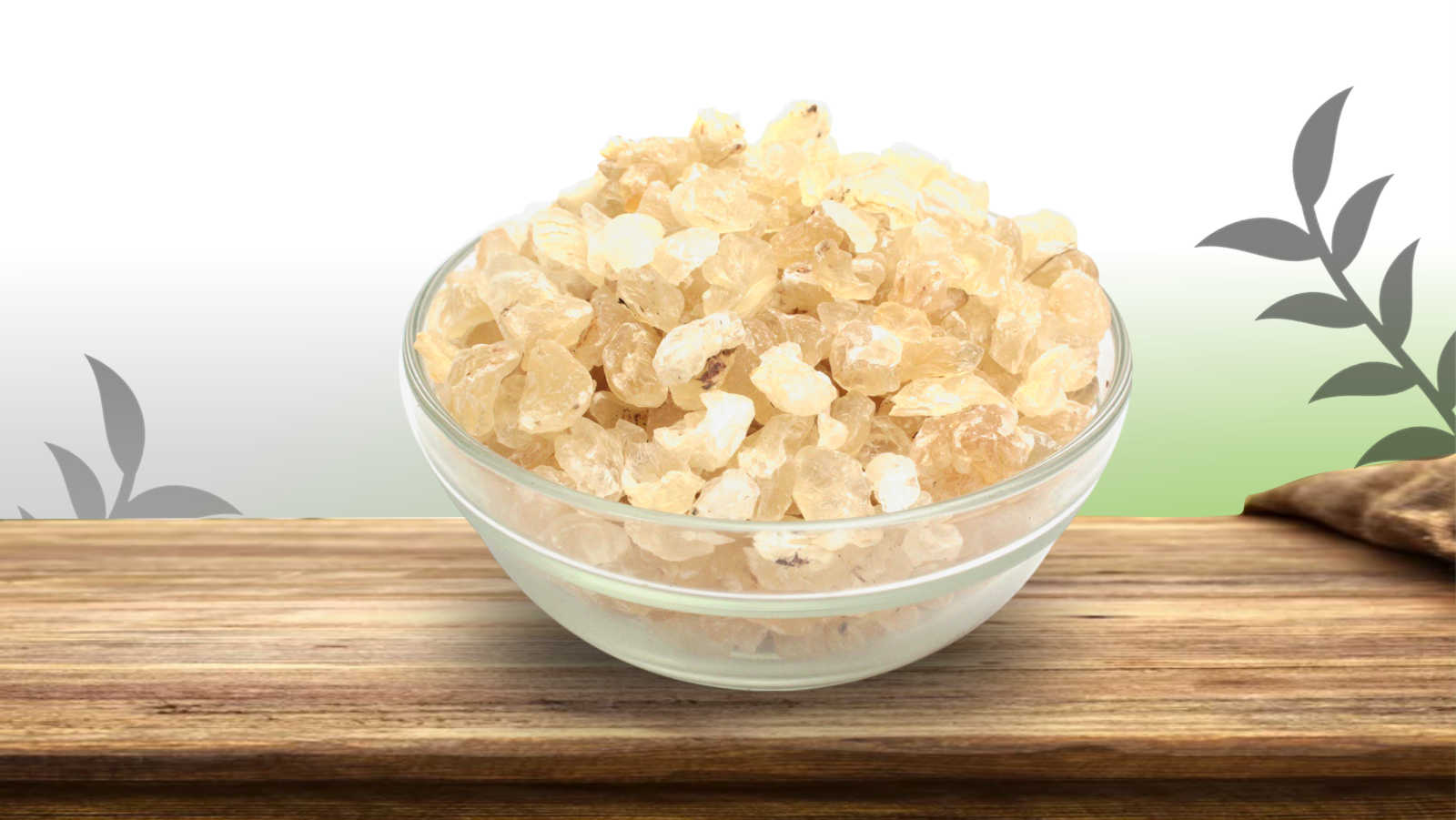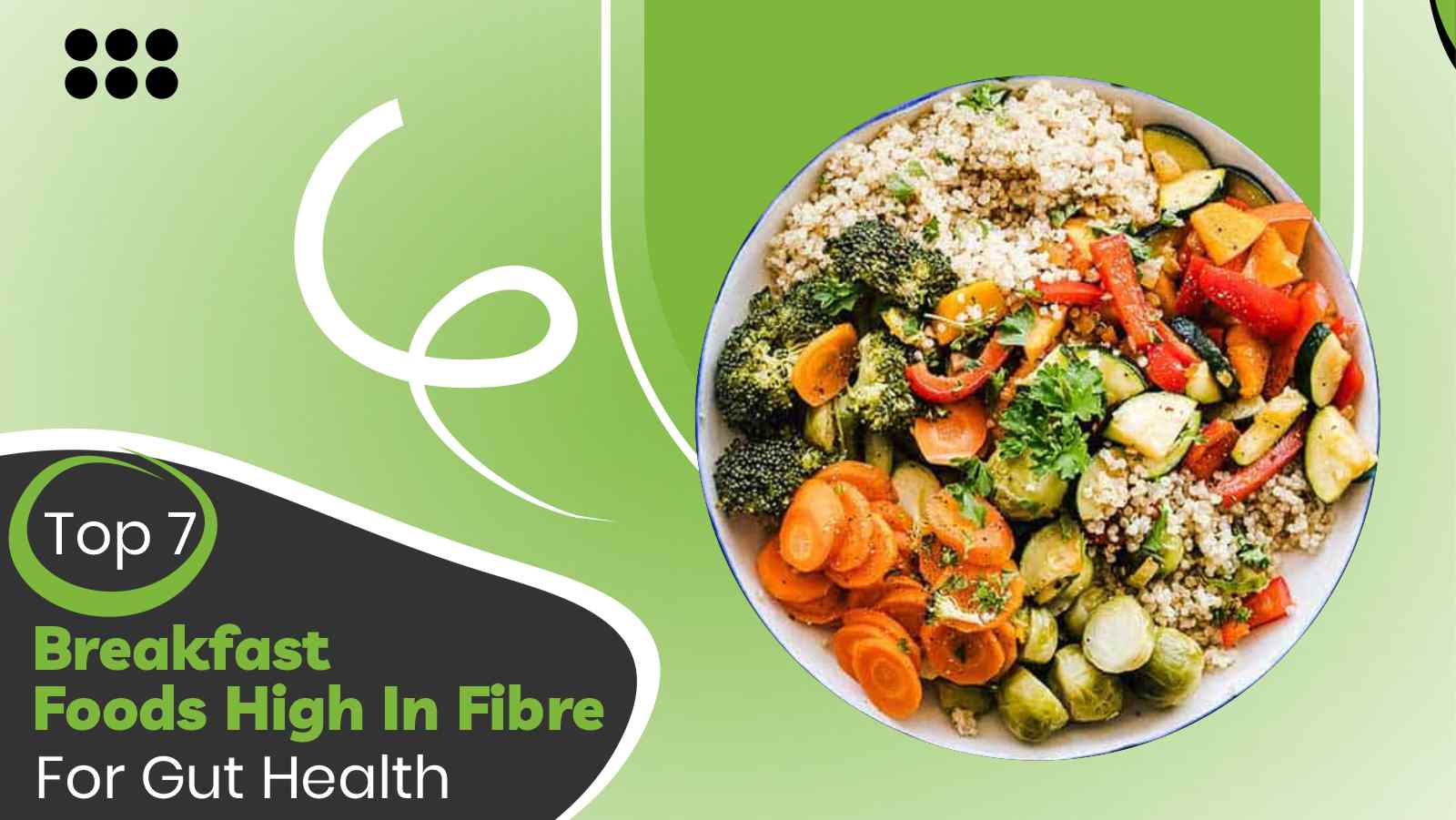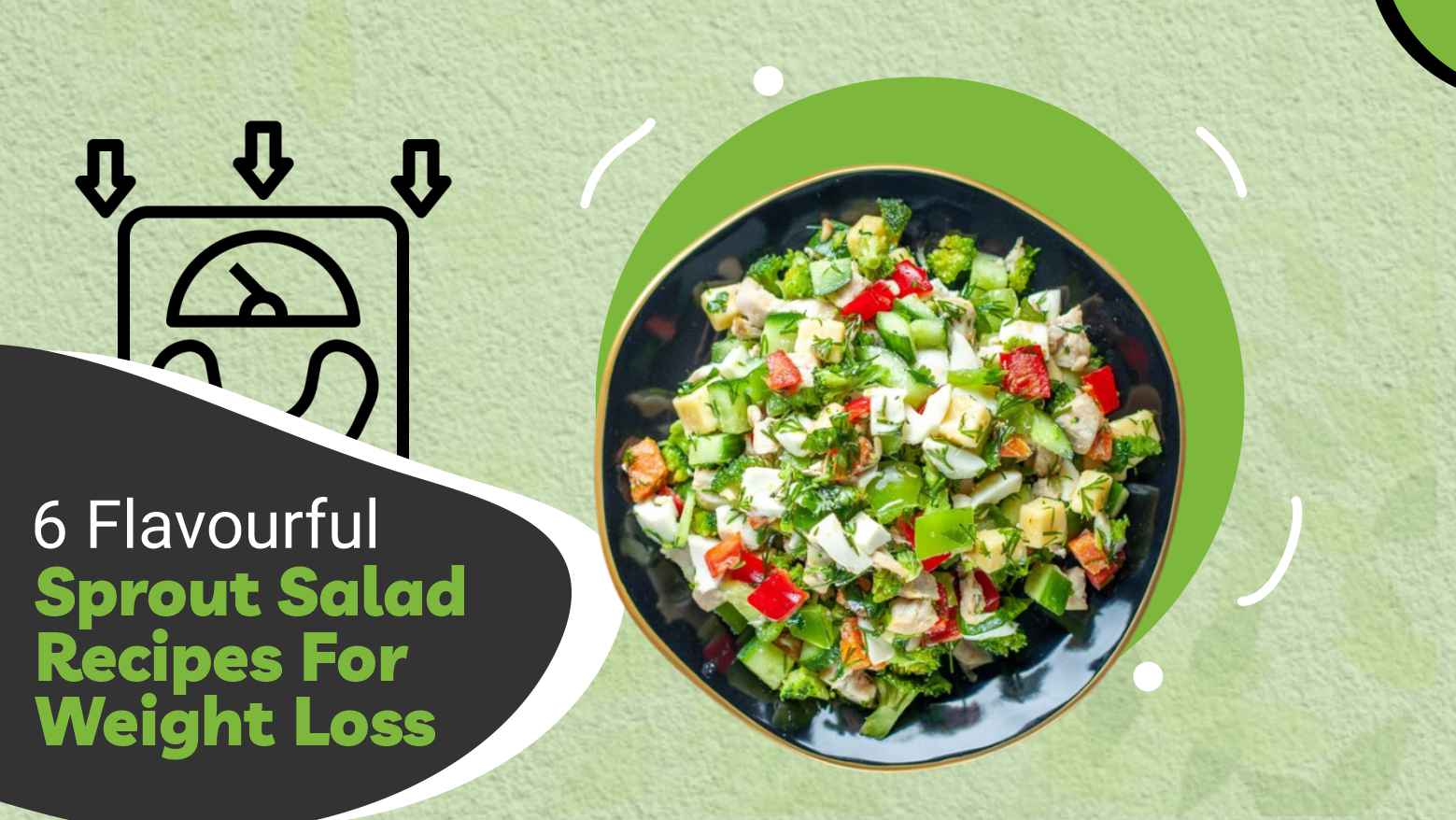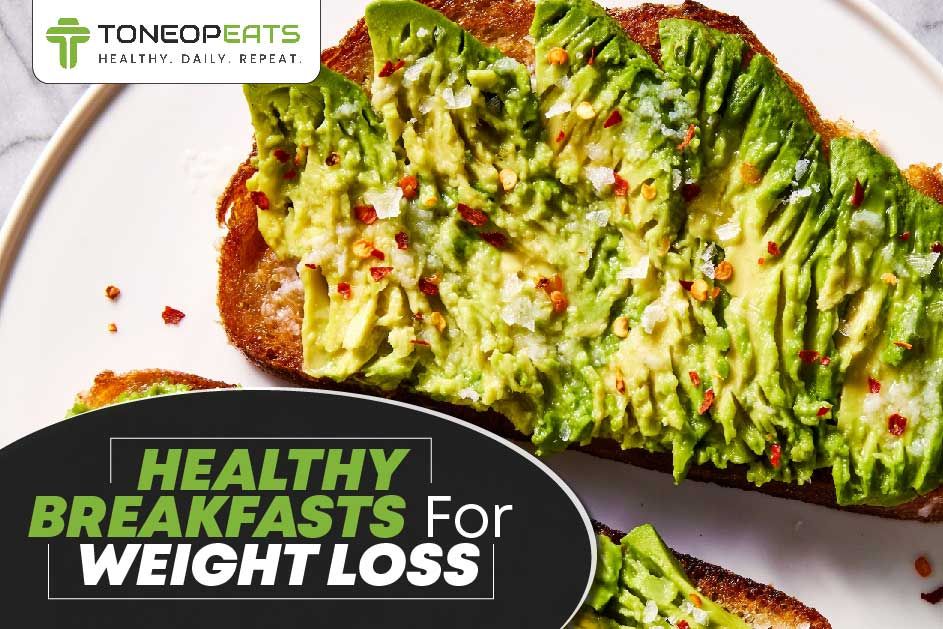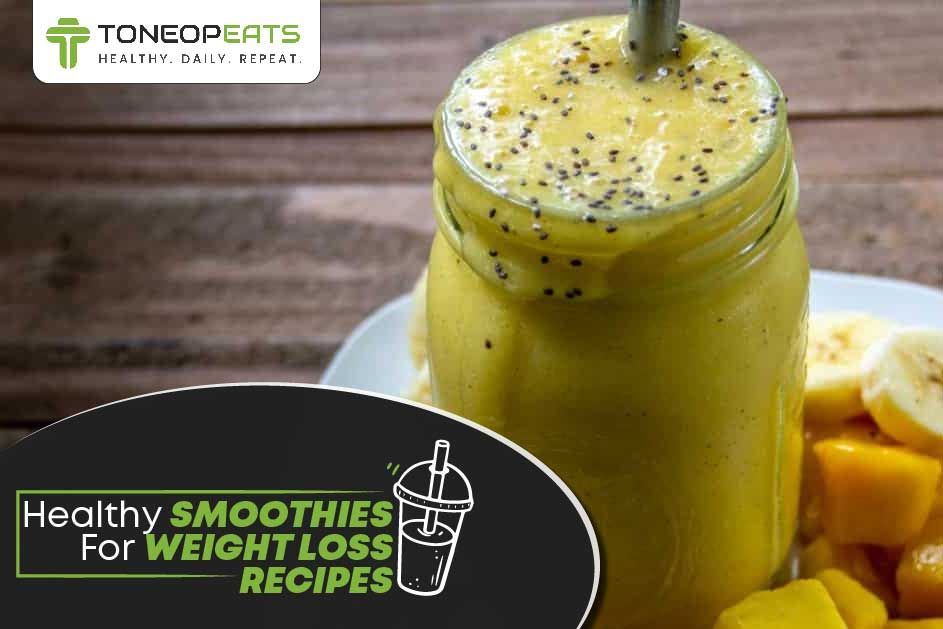Are you experiencing bloating, gas, or sluggish digestion? These might be signs your gut needs some TLC! Your gut is home to trillions of bacteria, both good and bad. Maintaining a healthy balance between these microbes is essential for digestion, nutrient absorption, and even your mood. Here's where the prebiotic and probiotic difference helps you achieve this balance. Prebiotics, like fibre in fruits and veggies, act as your gut's good bacteria fertiliser, helping them keep bad bacteria at bay. Meanwhile, probiotics in fermented foods like yoghurt or taken as supplements are live bacteria, reinforcing the already present good ones.
By working together, prebiotic and probiotic foods create a healthier digestive system for you! So, explore how prebiotic and probiotic difference impacts your gut health and help you get a healthier digestive system. Also, learn the prebiotic vs probiotic uses for taking the right dosage.
Table Of Contents
1. What Is Prebiotics?
2. What Is Probiotics?
3. 8 Differences Between Prebiotic And Probiotic For Health
4. 8 Best Prebiotic And Probiotic Uses
5. The Final Say
6. FAQs
7. References
What Is Prebiotics?
Prebiotics are the dietary fibre acting like fertilisers for the good bacteria in your gut. Unlike other types of fibre that your body can digest and absorb for energy, prebiotics pass through your digestive system largely intact. However, this is a good thing!
These special fibres feast on the good bacteria in your gut, helping them thrive and multiply. Prebiotics are naturally found in many fruits, vegetables, and whole grains, such as asparagus, bananas, garlic, leeks, and oats. Think of them as the gardeners tending to your gut's beneficial flora, providing nourishment to help them thrive and create a healthy and balanced environment.
What Is Probiotics?
Probiotics, on the other hand, are live bacteria themselves, similar to the good bacteria already present in your gut. They come from fermented foods like yoghurt, kimchi, sauerkraut, and kefir or can be taken as recommended supplements in capsule or powder form.
By introducing these beneficial bacteria directly, probiotics can help replenish and reinforce the good guys in your gut, further tipping the scales in favour of a healthy gut microbiome. Think of them as reinforcements sent as probiotic supplements to support your existing good bacteria army!
8 Differences Between Prebiotic And Probiotic For Health

Consider these prebiotic and probiotic differences for your overall health functioning to make them an essential part of your diet:
1. Supports Gut Microbiota Differently
Prebiotics: They help support gut microbiota by feeding and stimulating the growth of beneficial gut bacteria. These non-digestible fibres, found in foods like garlic, onions, and bananas, nourish the good bacteria already present in the gut. By promoting the proliferation of these beneficial bacteria, prebiotics help maintain a balanced and healthy gut microbiome, which is essential for balancing digestive health.
Probiotics: In contrast, probiotics directly introduce new strains of beneficial bacteria into the gut. These live microorganisms, found in fermented foods such as yoghurt, kefir, and sauerkraut, help to replenish and diversify the gut microbiota. By adding these beneficial bacteria, probiotics restore the natural balance of the gut flora, especially after disruptions caused by antibiotics or illness.
2. Different Aids For Digestive Health
Prebiotics: Prebiotics enhance digestive health by promoting a healthy balance of gut bacteria. The beneficial bacteria that thrive on prebiotics help to improve digestion and nutrient absorption, reduce gastrointestinal infections, and reduce irritable bowel syndrome (IBS) signs. Prebiotics contribute to more efficient digestive processes by giving these bacteria a favourable environment.
Probiotics: They aid digestion directly by producing enzymes that help break down food. These beneficial bacteria assist in the digestion of complex carbohydrates, proteins, and fats, making it easier for the body to absorb essential nutrients. Probiotics also help to maintain the gut lining integrity, preventing harmful enzymes from entering the bloodstream and thereby supporting overall gut health.
3. Prebiotics vs. Probiotics In Immunity Strengthening
Prebiotics: They improve immune function by supporting the growth of beneficial bacteria that can outcompete harmful pathogens. A healthy gut microbiome is beneficial for a stronger immune system, as the beneficial bacteria help regulate immune responses and prevent the colonisation of pathogenic microbes. By nurturing these good bacteria, prebiotics indirectly enhances the body's immune defenses.
Probiotics: Probiotics directly enhance the immune response by modulating the activity of immune cells. The beneficial bacteria in probiotics interact with immune cells in the gut, helping to stimulate and regulate the immune system. This interaction can boost the body's ability to fight off infections, reduce allergic reactions, and strengthen overall immune health.
4. Prebiotic And Probiotic Differences In Inflammation Reduction
Prebiotics: Prebiotics can indirectly reduce inflammation by promoting a healthy gut microbiota. A balanced gut flora helps regulate inflammatory responses in the body, reducing the chronic inflammation signs that causes various health issues. By supporting the beneficial bacteria growth, prebiotics contribute to a healthier, less inflamed gut environment.
Probiotics: They directly reduce inflammation by interacting with the immune system and gut lining. The beneficial bacteria in probiotics produce anti-inflammatory compounds and help to strengthen the gut barrier, preventing the leakage of inflammatory substances into the bloodstream. This direct action on inflammation can help manage inflammatory bowel disease (IBD) and other inflammatory disorders.
5. Prebiotics VS Probiotics In Nutrient Absorption
Prebiotics: They improve the absorption of minerals like calcium and magnesium by enhancing a healthy gut environment. The beneficial bacteria that feed on prebiotics help to enhance the gut's ability to absorb these essential nutrients. This improved nutrient absorption can improve bone health, energy levels, and overall well-being.
Probiotics: Probiotics enhance nutrient absorption by maintaining a balanced gut microbiome and improving gut barrier function. The beneficial bacteria in probiotics produce enzymes and other compounds that aid in the breakdown and absorption of nutrients. Also, a healthy gut barrier ensures that nutrients are efficiently transported into the bloodstream while keeping harmful substances out.
6. Differently Impacts Mental Health
Prebiotics: They indirectly support mental health by promoting a healthy gut-brain axis. It is the communication network between the gut and the brain, wherein a balanced gut microbiota helps in this interaction. By enhancing the growth of beneficial bacteria, prebiotics help balance a healthy gut environment, which positively impact mood hormones, cognitive function, and overall mental health.
Probiotics: They directly influence mental health by producing neurotransmitters and other metabolites that affect brain function. Certain strains of probiotics can produce serotonin, dopamine, and other chemicals crucial for mood regulation and cognitive processes. By introducing these essential bacteria into the gut area, probiotics help improve symptoms of anxiety, depression, and other mental health conditions.
7. Prebiotic And Probiotic Difference In Metabolic Health
Prebiotics: Prebiotics improve metabolic health by influencing the growth of bacteria that regulate metabolism and insulin sensitivity. A healthy gut microbiota can help to maintain optimal blood sugar, reduce the obesity risk, and improve overall metabolic function.
Probiotics: Probiotics directly affect metabolic health by producing short-chain fatty acids plus other metabolites that impact metabolism. These beneficial bacteria can help regulate appetite, reduce inflammation, and improve insulin sensitivity.
8. Prebiotics VS Probiotics In Allergy Prevention
Prebiotics: Prebiotics help prevent allergies by supporting a healthy gut microbiota that can modulate immune responses. A balanced gut flora can help prevent the immune system's overreaction to harmless substances, reducing the risk of allergic reactions. By nurturing beneficial bacteria, prebiotics contribute to a lower incidence of allergies.
Probiotics: They directly reduce the risk of allergies by influencing immune system development and response. The beneficial bacteria in probiotics can help train the immune system to differentiate between harmful vs harmless elements, reducing the likelihood of allergic reactions. Probiotics are particularly effective in early childhood when the immunity is still developing and prevent the onset of allergies later in life.
8 Best Prebiotic And Probiotic Uses
Try these ways to integrate the benefits of prebiotic and probiotic differences for your gut with their recommended uses:
Health Area | Prebiotics | Probiotics |
Skin Health | Support a healthy skin barrier by promoting beneficial gut bacteria. | Directly influence skin conditions like eczema or acne. Combining both could offer a comprehensive approach to skin health. |
Antibiotic-Associated Side Effects Reduction | Support the growth of existing good bacteria, potentially mitigating side effects like diarrhoea. | Replenish good bacteria lost during antibiotic treatment. Combining both can enhance gut health during and after antibiotic use. |
Lactose Intolerance Management | Promote the good bacteria growth that helps break down lactose, potentially improving lactose digestion. | It may not eliminate lactose intolerance symptoms, but it can aid digestion. Combining both could improve overall lactose digestion and tolerance. |
Inflammatory Bowel Disease (IBD) Support | Show promise in managing symptoms of IBD by reducing inflammation and promoting gut healing. | Probiotics may help repopulate beneficial bacteria, creating a more favourable environment for inflammation regulation. |
Travelers' Diarrhea Prevention | These fibres act like food for the bacteria already in your gut. By promoting their growth, prebiotics can help crowd out harmful bacteria that might cause traveller's diarrhoea. | By introducing additional good bacteria, probiotics can help compete with and inhibit the growth of pathogens that cause traveller's diarrhoea. |
Oral Health | Prebiotics aid in the growth of beneficial oral microflora that prevents harmful bacteria from colonising in the mouth. This prevents plaque formation and bad breath. | Certain probiotic strains can directly target and inhibit the growth of harmful oral bacteria. Additionally, probiotics may help reduce inflammation in the gums, a factor in gum disease. |
Athletic Performance Enhancement | Potentially improve gut health and nutrient absorption, enhancing athletic performance and recovery. | Certain probiotic strains may improve protein synthesis and reduce muscle breakdown, aiding post-workout repair. |
Personalised Medicine Approach | By identifying an individual's specific gut bacteria composition, prebiotic types and amounts can be personalised to promote the growth of beneficial strains lacking in their microbiome. | It is possible to choose particular probiotic strains that are recognised to meet the demands of an individual by analysing their gut health issues. Compared to generic probiotic pills, this customised approach may be more effective. |
Note these key considerations for using probiotics with prebiotics:
- Dosage and Instructions: Always follow the specific directions on the product label. This includes knowing whether to swallow whole, chew, sprinkle, or mix with liquid. Measure liquid forms carefully with a provided measuring device, not a household spoon. Consult your doctor if you have any questions.
- Antibiotics: Antibiotics can possibly interfere with the probiotics effectiveness containing live bacteria. Take probiotics at least 2-3 hours before or after taking antibiotics.
- Diarrhoea and Fever: If using probiotics for antibiotic-related diarrhoea, don't take them if you have a high fever or for more than 2 days without consulting your doctor. This eventually indicates a more serious medical issue.
- Seek Medical Attention: If your condition worsens, doesn't improve, or you suspect a serious medical problem, consult a healthcare professional immediately.
The Final Say
Ultimately, while prebiotics and probiotics contribute to a healthy gut microbiome, they achieve this in distinct ways. Prebiotics act like invisible gardeners, nurturing the good bacteria already present. At the same time, probiotics are the reinforcements that directly introduce new beneficial bacteria. This is why including both prebiotic and probiotic foods helps you create a balanced gut ecosystem, promoting better digestion.
So, listen to your gut and consider these prebiotic and probiotic differences to experience the benefits of a balanced and happy digestive system!
FAQs
1. What is the difference between using prebiotics and probiotics for lactose-intolerant people?
Prebiotics are non-digestible fibres that feed beneficial gut bacteria, while probiotics are live beneficial bacteria. Prebiotics are typically easier to handle for lactose-intolerant individuals since they don't contain live cultures that might be grown in dairy. On the other hand, probiotics should be chosen carefully to avoid lactose-containing products.
2. Which sources of prebiotics are often recommended?
Recommended sources of prebiotics include foods like chicory root, garlic, onions, leeks, asparagus, bananas, and whole grains like oats and barley. These foods contain fibres such as inulin and fructooligosaccharides that nourish beneficial gut bacteria.
3. What are the best prebiotic vs. probiotic foods?
Consider these sources of prebiotic and probiotic foods:
- Prebiotic Foods: Chicory root, garlic, onions, leeks, asparagus, bananas, oats, and barley.
- Probiotic Foods: Yogurt (lactose-free varieties for lactose intolerant individuals), kefir (lactose-free varieties), sauerkraut, kimchi, miso, tempeh, and kombucha.
4. What are the prebiotic and probiotic differences in supplement form?
Prebiotic supplements usually contain fibres like inulin or fructooligosaccharides, which help nourish gut bacteria. Probiotic supplements contain live bacteria strains, such as Lactobacillus and Bifidobacterium. For lactose-intolerant individuals, it is important to choose dairy-free probiotic supplements to avoid gastrointestinal discomfort.
5. Are there any side effects of prebiotic foods?
While prebiotics are generally safe, they can cause digestive discomfort in some individuals, especially when consumed in large amounts. Common side effects include gas, excessive bloating, and stomach cramps. It’s often recommended to start with small amounts and slowly increase the intake to allow the gut to adjust.
References
- https://www.webmd.com/drugs/2/drug-154514/probiotic-with-prebiotic-oral/details
- https://www.medicalnewstoday.com/articles/323490
- https://intermountainhealthcare.org/blogs/difference-between-probiotics-and-prebiotics
- https://health.clevelandclinic.org/prebiotics-vs-probiotics-whats-the-difference
- https://foodrevolution.org/blog/probiotics-and-prebiotics/
About ToneOp Eats
ToneOp Eats is your go-to health kitchen, delivering nourishing meals in Bhopal, Indore & Bangalore. The meals are prepared with strategically planned nutrition and portions for your health goal. With just three simple steps, you can subscribe to a meal plan for weight loss, muscle gain, or balanced diet goals. Experience the perfect blend of taste and wellness in our nutrient-dense and calorie-counted range of meals, including protein-rich grills and meal bowls, full of fibre salads & smoothies, workout-friendly protein 30,40,50 meals and refreshing juices.







